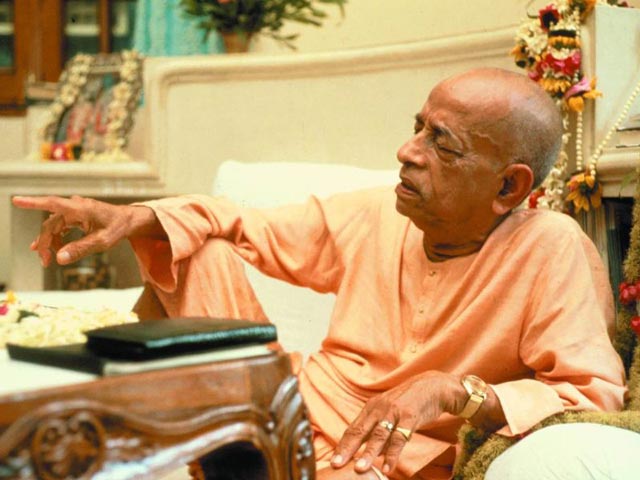
The following conversation between His Divine Grace A. C. Bhaktivedanta Swami Prabhupada and members of the United Nations World Health Organization took place in Geneva on June 6, 1974.
WHO member: There is one thing that I cannot reconcile. As an Indian, the question bothers me very, very often. I believe in a great many things that you said about returning to a simpler, more natural way of life. And about finding satisfaction in our spiritual dimension. There’s no question about that. I’m not what you would call a “Westernized Indian.”
But what I cannot reconcile is the fact that we who had this spiritual knowledge and all our cultural guidelines, which you have just now said are the solutions to all our problems – with all these guidelines we have not been able to keep our society free from so many evils that have come about. I’m referring not only to the poverty but also to the unemployment and to the hunger and to so many other things.
Srila Prabhupada: No, it is not because of our cultural guidelines, but because of bad leaders who do not follow them. It is due to these bad leaders.
WHO member: They are our own people.
Srila Prabhupada: They may be our own people. They may be our own father. Prahlada Maharaja was a devotee of the Lord, and yet his father was Hiranyakasipu, an utter demon. So what can be done? Most people are good, and yet so often we see that their leader is a godless demon.
WHO member: Yes, Hiranyakasipu had to be destroyed.
Srila Prabhupada: So he was destroyed. By God’s grace he was destroyed. And every one of these modern demonic leaders – they will be destroyed. These demonic leaders will not stay. But everything takes time.
At the present moment our leaders are not very good. Blind. They have no knowledge, and yet they are leading. Andha yathandhair upaniyamanas: the blind leading the blind – into the ditch. These leaders have killed the world’s original, spiritual culture, and they cannot give anything in its place.
WHO member: So has your movement involved itself in social philosophy, then?
Srila Prabhupada: Yes. This movement is most practical. For instance, we are recommending no meat-eating. And the leaders do not like it. We are not very favorable to their propaganda. So the leaders don’t like us. After all, they have allowed slaughterhouses, and beef shops anywhere and everywhere, and we are saying, “No meat-eating.” So how will they like us? That is the difficulty. “It is folly to be wise where ignorance is bliss.” But still we are struggling.
And the alternative we are recommending is also practical. These God conscious farming villages have proved successful. The inhabitants are finding their life happy and abundant. Nature’s bounty supplies fruit and vegetables and grain. And the cows supply milk, from which you can get yogurt, cheese, butter, and cream. So with all these ingredients, you can make hundreds and thousands of delicious preparations. And you feel fully satisfied. That is the basic principle.
WHO member: That is an example of a successful enterprise, but would you speak about something now that has not been tried before?
Srila Prabhupada: The “new thing” is that these people living in God conscious farming villages do not have to travel away for their daily bread. That is the new thing for modern society. At present, most people have to travel some distance to the factory or office. I happened to be in Bombay when there was a railway strike – oh, people were suffering so much. You see? From five o’clock in the morning they were standing in a queue for catching a train. Of course, during the strike hardly any trains were running. So people were in so much difficulty. And if one or two trains were running, so many people were trying to squeeze themselves into the cars. Smashing themselves in. They were even on top of the train.
Of course, in the more industrially advanced countries, the people go to the factory or office in cars – and risk being killed in highway crashes.
So the question is, Why should one be induced to go so many miles away from his home simply for earning his livelihood? This is a very bad civilization. One must obtain food locally. That is a good civilization.
WHO member: I understand that your goal is to have everybody become selfsufficient in regard to food. But if all the people are engaged in the production of food, then who will be providing other things?
Srila Prabhupada: We don’t say everyone should be engaged in food production. According to the Bhagavadgita, naturally you will have a section of men who will produce food, a section of men who will give spiritual direction, and a section of men who will manage as the government or king. And the rest of the people are laborers who help all the other sections.
Not that everyone will be a cultivator. No. There must also be a brain department, a management department, and a worker department. These groupings are natural within any society. And all of them should work together for spiritual cultivation.
